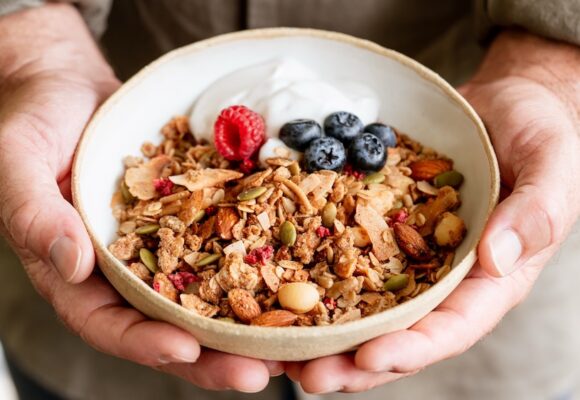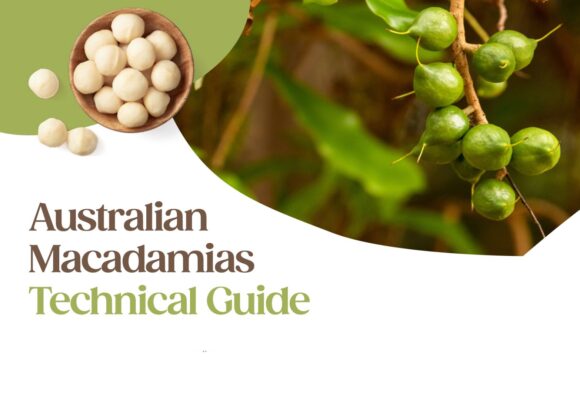Macadamia oil is often described as ‘liquid gold’ and a closer look at its health benefits and versatility makes it clear why. Free from cholesterol, sodium, sugar and trans fats, as well as a source of vitamin E, heart-healthy monounsaturated fats, palmitoleic acid and phytosterols, it’s a versatile oil that’s just as at home in domestic kitchens and food products as it is in anti-ageing skincare.
Here we explore the breadth of its culinary and cosmetic applications, delve into the intricacies of the macadamia oil extraction process, unpack why Australian origin matters, and reveal the connection between macadamia oil and a ground-breaking development on the horizon: de-fatted macadamia flour.

Flavour, functionality and a marketing advantage
The Australian macadamia industry’s research into emerging food trends highlighted macadamia oil as a product format with significant innovation potential. The research found that consumers are seeking ways to easily enhance their food and transform simple ingredients into showstopping dishes. The high concentration of heart-healthy fats in macadamias allows them to function particularly well in liquid form, adding depth and richness, but also creating a natural plant base for a range of dairy-free products.
Josh Gadischke is Managing Director at Plenty Foods, Australia’s leading cold pressed oil manufacturer and the first to produce macadamia oil commercially more than 30 years ago. He says macadamia oil possesses a number of unique characteristics that make it the preferred specialty oil for many consumers and manufacturers.

“As a food ingredient, macadamia oil is unique in that it has a mild, buttery flavour that isn’t overpowering. This means it won’t compete with other flavours in a product or dish, so it’s a good complimentary oil,” Josh explains.
“It also has some powerful practical advantages in that it has high heat tolerance, and it’s highly monounsaturated which makes it a very stable oil. It doesn’t oxidise quickly and has a good shelf life.”
“Consumers love it as a specialty oil they can use as a base for salad dressings and for shallow frying, pan frying or barbecuing over high heat.”
When it comes to food manufacturing, Josh says macadamia oil is favoured by many biscuit manufacturers and bakeries, and its presence in a product paves the way for a more premium positioning.
“There’s a definite marketing advantage for manufacturers who embrace macadamia oil. We have several fetta cheese producers who marinate their fetta in our macadamia oil. It gives the product a lovely golden colour on-shelf, and by flagging macadamia oil on their labelling, it positions it as a more premium product.”
A powerful skincare ingredient
Macadamia oil is a sought-after ingredient in the skin and hair care industries, and with good reason. It’s high in palmitoleic acid, an omega-7 fatty acid that helps to restore tired, ageing skin back to plump youthfulness. It also contains oleic acid which helps to repair dry and sensitive skin, and linoleic acid, which helps restore the skin’s natural barrier, locking in moisture without clogging pores.

“Macadamia oil is used in a variety of skin care products as well as hair conditioners and lip balms. We’ve begun to see some small-scale use in soap products too,” says Josh.
“Its profile allows the oil to soak in and nourish the skin without leaving a greasy finish,” he explains. “That’s a quality that’s unique to macadamia oil. Most other oils just sit in the pores of the skin and don’t penetrate much further. Macadamia oil is the opposite – put it on your skin and it sinks right in. Its profile is very similar to the skin’s own sebum which allows it to be easily absorbed. Skincare manufacturers like that because it allows them to make a moisturising cream that can nourish the skin without leaving a heavy, oily finish.”
Cold pressing and zero waste production
Most traditional oils like canola or sunflower are typically extracted using a pre-cooking process where their seeds or kernel are heated to above 100 degrees Celsius. While this is a high yielding process, the oil that results is often quite dark with an unpleasant taste and odour. A secondary refining process is required in order to remove this before the product is sent to market.
Macadamia oil is one of the few oils that lends itself to cold pressing. As Josh Gadischke explains, it’s a process that delivers several advantages.
“When we’re producing a macadamia culinary oil, we extract the oil at a lower temperature without the pre-cooking stage. That produces an oil that’s a nice, golden colour that tastes and smells like macadamias, with no burnt or dark colour. Yes we could pre-cook the nuts and get a higher yield but that goes against the lovely flavour we want to retain in the finished oil,” he elaborates.

At the end of the cold pressing process, the remnants of the kernel from which the oil has been extracted are recovered and repurposed as animal feed.
“It’s a high-protein, sought-after animal feed, particularly for beef cattle. It’s gratifying knowing that at the end of the process, we’ve produced a premium quality, zero-waste product,” explains Josh.
The importance of origin
With around 40% of Plenty Foods’ macadamia oil exported to food and cosmetic businesses across Asia and Europe, Josh has an in-depth understanding of what matters to commercial buyers. And reliable country of origin is high on the list.

“Customers buy from us because they like and trust Australian macadamias. Adulterated oils is a growing and significant problem around the world – it occurs when macadamia and other premium oils are covertly diluted with other low-cost oils, and it’s often hard to detect,” Josh says.
“Australia is known and trusted for the purity of the oil we cold press here, whether for cosmetic or culinary use. People want to know they can trust what they’re putting in their food and on their skin, and they have confidence in Australian origin product.”
Macadamia flour: the next frontier
The rise in demand for gluten free products has seen a plethora of alternative flours hit the market, and nuts have played a role in this, with almond flour used as a replacement in many recipes and products. But macadamia flour could soon be available as a revolutionary new gluten free alternative, with Plenty Foods investing in new flour production equipment that is currently under construction.
“We are on track to start producing in about 18 months. We will be the first in the world to produce a de-fatted macadamia flour,” Josh reveals.
“Making flour out of any nut is challenging because of the oil content, and particularly so with macadamias, but with our existing capabilities in oil extraction, we can produce a much lighter, super-fine and fluffy flour that closely resembles traditional wheat flour. It won’t have that heavier, dense finish that can be typical of other nut flours.”

Josh says their macadamia flour also holds potential as a beverage ingredient as it performs well as a drinking powder.
“The way it’s produced is similar to cocoa powder, which is essentially flour from a cocoa bean. In the USA, peanut flour is already being produced as a high-protein beverage ingredient. The sports nutrition market is growing, and nut flours are gaining popularity in this space as they’re a natural alternative to some of the synthetic proteins that often feature in formulations.”
Want to know more?
For more information about the benefits and commercial applications of Australian macadamia oil, please contact Australian Macadamias Market Development Manager Jacqui Price.


